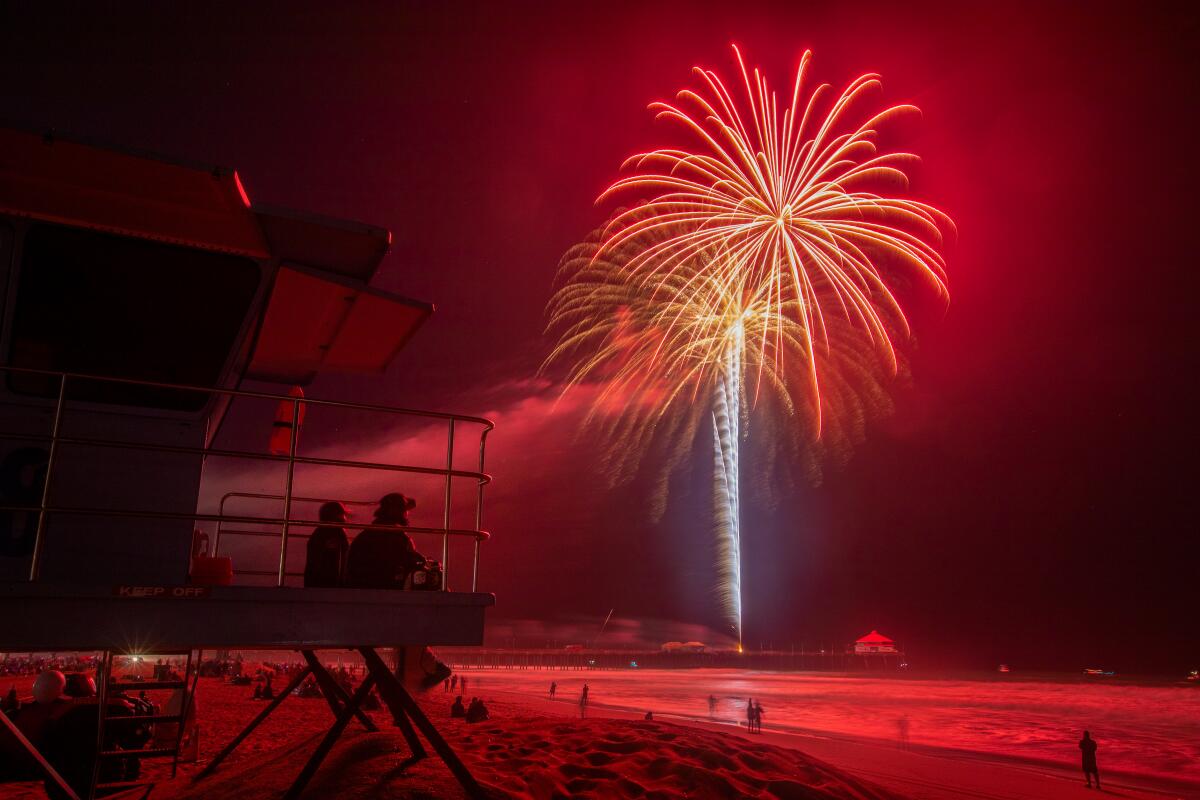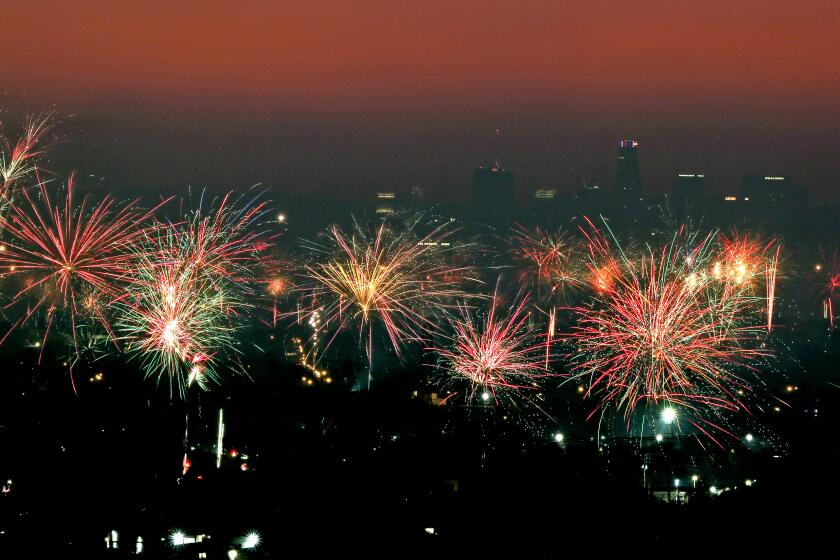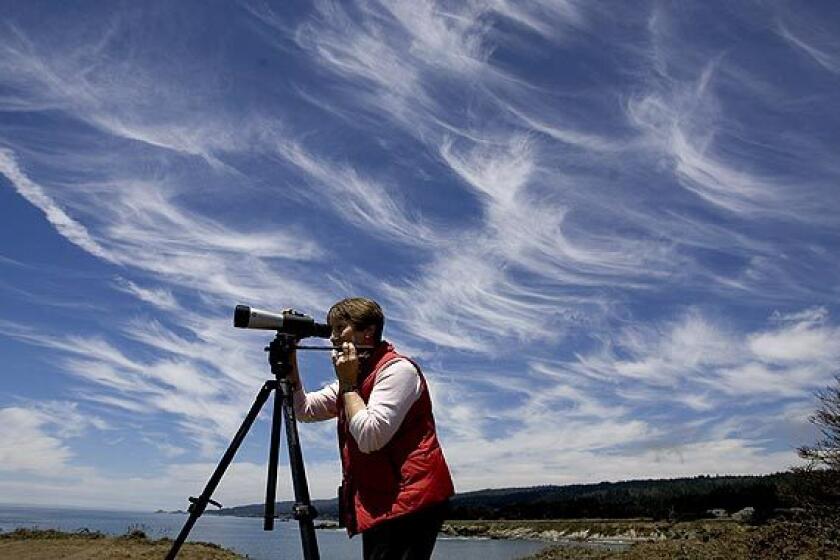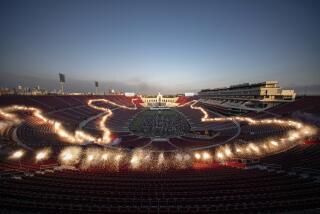Critics say July 4th fireworks damage the L.A. environment and are demanding action

A growing debate over the possible environmental damage caused by fireworks shows, especially over waterways, recently erupted in federal court where climate activists are pushing for stronger regulations of a popular Independence Day celebration in Southern California.
While fireworks have for years been known to cause significant air pollution — with July 4 and 5 recording some of Southern California’s worst air quality days — activists and attorneys with the Coastal Environmental Rights Foundation want officials to help minimize the damage fireworks pose to waterways when the pyrotechnics debris and chemicals sink into the ocean or other water sources.
The conservationists’ latest target is the Big Bang on the Bay July 3 fireworks show in Long Beach, which draws large crowds for the yearly display that lights up the night sky over Alamitos Bay. The environmental rights group wants to see the early Independence Day show admit it is a “discharger” of pollutants into the bay, and therefore required under the federal Clean Water Act to meet certain standards and mitigation plans.
The organizers of the Long Beach show reject the idea that the fireworks cause significant damage to the bay.
That debate landed last week in federal court, with a ruling on the case expected in the coming weeks — a decision that could possibly affect the permitting process for other coastal fireworks shows across the state, including those in Marina Del Rey, Redondo Beach and Manhattan Beach.
“We’ve been working on getting Clean Water Act compliance for fireworks discharges over water going on 18 years,” said Livia Borak Beaudin, one of the lead attorneys suing the organizers of the Long Beach show. While a victory in court wouldn’t result in an outright ban on fireworks shows over water, it would require stricter permitting for the shows to better protect waterways.
The South Coast Air Quality Management District issued a particulate advisory through Tuesday for much of Southern California because of fireworks.
Beaudin said she’s hopeful for a ruling broad enough that it will apply to shows beyond the Big Bang on the Bay.
“We do intend to look at other shows,” Beaudin said. “We’d like to see the Clean Water Act enforced statewide.”
The federal lawsuit, filed in November 2021 in U.S. District Court, is the latest push from environmental activists to improve the regulation of fireworks shows and minimize their harm to natural resources and wildlife. A growing body of research has found that the noise and light from fireworks, as well as the chemicals that create the colorful explosions, “contribute significantly to chemical pollution of soil, water and air, which has implication for human as well as animal health,” according to a paper published last month in the Pacific Conservation Biology journal.
The lawsuit alleges the Big Bang on the Bay event violates the Clean Water Act because organizers “have discharged and continue to discharge fireworks debris and pollution into Alamitos Bay and the Pacific Ocean without a permit.” While organizers have obtained Long Beach city permits for the event, the suit alleges they need specific permits to comply with federal law.
The lawsuit names as defendants event organizers John Morris and the Naples Restaurant Group, which own and run the Boathouse on the Bay restaurant in Long Beach that puts on the annual charity event. They have denied the allegations, court records show.
Attorneys for Morris and the restaurant group did not respond to requests for comment from The Times.
The Big Bang organizers have said that since at least 2016 they have monitored and analyzed the environmental impact of its fireworks show — after they were put on notice for the lawsuit — and have concluded there isn’t evidence of such waterway or wildlife damage.
“The organizers of the Big Bang on the Bay fireworks event are committed to preserving the beneficial uses of the outdoor environment for the public users in Alamitos Bay,” a firm contracted for the event wrote in an August 2022 report to the regional water board. “Based on the results of water testing and debris searches, the Big Bang on the Bay event did not have a measurable deleterious effect on receiving waters within the event area.”
The consulting firm that conducted the analysis noted there were a lot of “complicating factors” for searching for fireworks debris and testing the water, like winds, lack of light, other boats in the harbor, fast currents — some of the same issues Beaudin said her team ran into when trying to prove fireworks create waterway pollution.
Still, Beaudin said she took issue with the event’s 2022 analysis, noting that in prior years the consulting firm did find elevated levels of some pollutants, like metals, in the bay after the show, as well as physical debris from the fireworks.
The Los Angeles Region of the California Regional Water Quality Control Board recently called the Big Bang on the Bay a “suspected discharger,” and ordered additional monitoring and analysis “as part of its investigation of potential impacts associated with public displays of fireworks in the Los Angeles Region,” according to a June 2022 order from the board.
Ailene Voisin, a spokesperson for the Water Resources Control Board, said that investigation remains ongoing, but declined to comment further.
The state banned Gualala’s Fourth of July display after complaints that the 2006 one disturbed shorebirds. A lawsuit and threats of business boycotts add to the discord among residents of the area.
Other environmental officials have also recently taken note of the potential problems from fireworks shows. At a June 2022 California Coastal Commission meeting, some commissioners called for more research on the issue — but noted the commission didn’t have the resources to dedicate much time to the issue, and didn’t yet have clear evidence of significant harm.
Beaudin said many Long Beach residents who live near the Big Bang on the Bay show have collected debris from the fireworks and noticed residual effects in the air and water, often avoiding the area afterward.
“Alamitos Bay is intended to be used for recreational purposes and it’s not fit for that use because of the debris and discharges,” Beaudin said. “This is something that isn’t necessary, right? It’s purely for entertainment purposes.”
While some places have banned fireworks for environmental reasons, like the Galapagos Islands in 2018, Beaudin said she would like to see California make reasonable changes for such shows, such as setting off the fireworks over land instead of water, or replacing the displays with drone- or laser-based light shows.
Are fireworks shows “really something that we should be doing when we’re dealing with climate change impact?” Beaudin said. “It doesn’t seem like there’s a necessity for this.”
More to Read
Sign up for Essential California
The most important California stories and recommendations in your inbox every morning.
You may occasionally receive promotional content from the Los Angeles Times.













